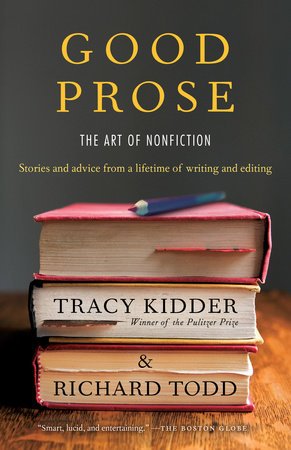“Good Prose: The Art of Nonfiction” by Tracy Kidder & Richard Todd
Paperback, 224 pages
Published in 2013 Random House Trade Paperbacks
ISBN-10 : 0812982150 | ISBN-13 : 978-0812982152
Date Finished: May 30, 2015
How strongly I recommend it: 8/10
Find it at BookShop.org or Amazon
I’ve made a habit of reading all the books that come out about writing. This one was very good.
My Notes:
Kidder wrote and rewrote many versions of his first Atlantic piece, about a mass murder in California. He had imagined the piece as a sequel to In Cold Blood. At some point Bob Manning send the manuscript back to Todd, having scrawled on it, “Let’s face it, this fellow can’t write.” Todd kept this comment to himself and merely told Kidder that the piece still needed fixing, and the rewriting continued.
“Kidder’s great strength is that he’s not afraid of writing badly.”
Every writer needs another set of eyes.
EB Wite in Elements of Style suggests that the reader is always in danger of confusion. The reader is “a man floundering in a swamp” and it falls to the writer (whose swamp if course it is) to “drain this swamp quickly and get his man up on dry ground, or at least throw him a rope."
But usually what’s missing isn’t a story. What’s missing is a broader way of thinking about what makes for a good story.”
The goal is the get the character off the page and into the reader’s imagination When this happens transport follows.
The honest nonfiction storyteller is a restrained illusionist.
Don’t mess with chronology unless you have a good reason.
Self doubt, fatal in so many enterprises, fortifies the essay.
Didion’s best known sentence, “We tell ourselves in order to live,”
John McPhee once said, “Things that are cheap and tawdry in fiction work beautifully in nonfiction because they are true.
Every story has a history and the actors and witnesses will remember it differently—that is if they are still alive and willing to talk and haven’t colluded in concocting a sanitized version.
A.J. Liebling’s, “I can write better than anybody who can write faster, and I can write faster than anybody who can write better.”
My adolescent dreams of writing something classic had turned into the necessity of writing something publishable.
Writers who need editors have to learn to listen, really listen, to advice that no one wants to hear—that you should jettison hard-earned pages, that you must start again. But how an editor delivers this advice makes all the difference, or has in my case, anyway. Every piece of writing, even classic works, can be ridiculed.
I think that the ability to preserve the discretion between the writer and the writing is a skill an editor needs more than a writer does.
Kidder, in one of the many head games he plays upon himself, has a capacity to pretend that his first draft is his final draft even though another part of his mind knows full well that it will be altered greatly, maybe even discarded.
Adjectives and adverbs suffering from exhaustion: Sustainable, green, iconic, incredible and incredibly. The last two, like Chernobyl, should be out of service for decades to come. Ironic and ironically need must be used reluctantly and not as labels for things that are merely odd.
For more… find it at BookShop.org or Amazon
